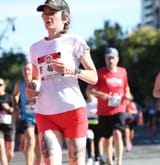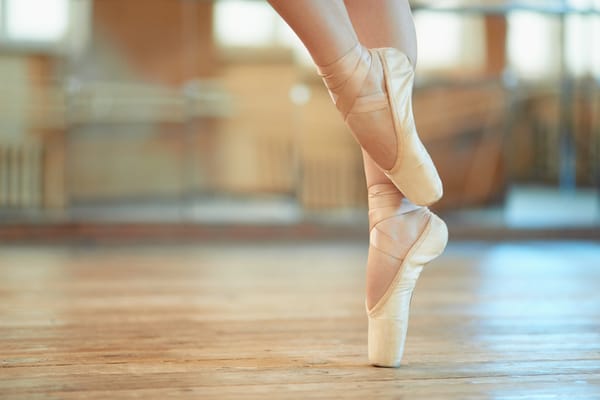Gaslighting and Fitness Culture

Happy Friday! What's good?
We've had the first substantial snowfall of the season here in NYC this week — indeed, the first accumulation of snow in the city in over 700 days. It's been bitterly cold as well, and while I know many of you are brave enough to exercise outside in this sort of weather, I've resorted to doing my workouts this week on the treadmill and on the Peloton bike in the apartment building's gym.
I'll write more about these technologies at some point, no doubt — specifically the history and the business of. But as I've been feeling a little bit bad about not toughing it out outside, I reckoned I'd try to write through some of my thoughts. Yes, even with all the misgivings I have about fitness gadgetry, I am uncomfortable with some the talk I hear online that these machines aren't as "good for you" as running or biking outdoors — it's "not the same"; it doesn't "count." "You won't be ready to race outdoors if you train indoors" and such. I need to push back – just for my own sense of self, if nothing else.
Because seriously, fuck that. You're no less an athlete because you modified a workout, because you ran or biked inside.
Some of the talk of "real workouts" has made me think about the ways in which fitness culture gaslights us — inspired, no doubt, by a book I finished reading this week, Unshrinking: How to Face Fatphobia (1) by philosopher Kate Manne. She argues that gaslighting is key part of diet culture — it is
a systematic process that works to make us feel defective in some way for the beliefs, thoughts, feelings, desires, and appetites to which we are, in reality, entitled. We are made to feel guilty, sinful, shameful, irrational, oversensitive, or paranoid — as well as, sometimes, downright crazy — for harboring these mental states. Gaslighting attacks a person’s mental freedom, her capacity for independent thought.
Diets simply do not work — for the vast majority of dieters, any weight lost is gained back within a few years. And yet millions of us are currently dieting, spending billions of dollars every year on various weight-loss products and programs. Why? We're being gaslit, Manne argues. We're told — subtly and overtly — that we cannot trust our own bodies. We're told that our bodies are out of control. Rather, Manne writes, "our minds, under too-tight control, forestall our body’s bid for freedom —from, among other things, chronic hunger."
To say that fitness culture too engages in gaslighting runs counter to the prevailing narrative — that becoming "healthier" gives one a better understanding of one's own body. Saying that fitness culture relies on gaslighting runs counter to the prevailing ideology of fitness technologies too — that these devices give us more accurate and more in depth data (and thus knowledge) about ourselves.
But there are plenty of times when all this health and fitness data challenges the way in which we physically or emotionally perceive things — that message from your watch that you didn't sleep well when you wake up feeling pretty rested. Plenty of times when the data undermines our certainty and confidence – you're at risk of "detraining," your Garmin cautions you if it perceives you've dialed back the intensity of your workouts. Plenty of times when data from one device is contradictory to data from another — the discrepancy between how far your watch says you've run and how far the treadmill does. All of this data can keep us second-guessing our own ability to judge distance, effort, pace, progress, fitness. And this in turn makes us feel further reliant on these technologies to tell us how things are "really" going.
(At the same time, we're made to feel bad if we lean too much on the Garmin, the Peloton, or the super shoe.) I'm only a chapter or so into the next book I'm reading — Filterworld: How Algorithms Flattened Culture by Kyle Chayka — but I can tell that his concept of “algorithmic anxiety” is going to be useful in understanding how health data and fitness technologies might make us us feel worse about ourselves.
The paragraphs above are a sort of a jumbled mess of thoughts, I realize. It's been a long, long week. Let's just review the week's news, shall we?
Peloton shares its predictions for 2024 wellness trends, and no surprise, longevity and recovery topped the list. (Also exercising outdoors, ffs.) Also getting in on the longevity beat this week is The Washington Post with this story: "At 93, he’s as fit as a 40-year-old. His body offers lessons on aging." And as I observed last week, a lot of the stories about longevity are actually just fluff pieces about Bryan Johnson and his anti-aging hustle. Case in point: "The Meme King of Longevity Now Wants to Sell You Olive Oil," via The New York Times. Speaking of longevity, there's an algorithm that can predict when we'll die. So that's "algorithmic anxiety" in a nutshell right there, eh?
Still more bad health technology ideas: "The CPR dummy of the future can piss blood," says Engadget. How universities bend over backwards to accommodate robot food delivery startups on campus. Elon Musk has yet another dumb idea — this time gym equipment based on the "Cyberhammer," the tool used to demonstrate the "resilience" of the Cybertruck. There was that whole, ridiculous Stanley cup brouhaha, which I think I mostly missed by not following enough water influencers online? Coming soon to a gentrified neighborhood near you: Upgrade Labs — "the World's First 'Biohacking' Franchise." "Will a Full-Body MRI Scan Help You or Hurt You?" Shrug emoji.
More algorithmic questions and promises: "Can ChatGPT Train Me for the Boston Marathon?," asks Outside. "Patients’ social needs often get lost in health records. Generative AI could help," says Stat News. Sure, man. AI will change gymnastics judging, MIT Technology Review argues, by making it more "objective" — because, you know, the AI is built on historical data that is totally free of bias.
Elsewhere in business of fitness tech: Bloomberg says that the future of VR is fitness. I thought the future of VR was gaming. Maybe the future of gaming is fitness? IDK. And FWIW: "So, You Want to Buy a Pro Sports Team? Here’s How." Venture capital research firm CB Insights offers its look of "the most promising digital health startups" of 2023. (I'm a little late to that one, but it's been in my Instagram ads a lot. I'm sure the most promising digital health startups of 2024 are totally different.) Apple will remove the blood-oxygen tool from its watches to avoid the import ban. Via Axios: "The big business of sleep." The WSJ profiles the CEO of Adidas.
Random running stuff: The Gothamist profiles Jason Girouard, who ran every street in NYC. Strava took its user data, combined it with a survey, and issued a press release, making all sorts of claims about how different generations keep active and stay motivated. "43% of Gen X athletes on Strava say they’ve been listening to the same workout music for years." I LOL'd. Then I cranked up the "80's Rock Anthem" playlist I made in iTunes (because kids, I'm too old to even use Spotify).
An update on Monday's post: I've got an (in-person!) appointment with a therapist next week. Thank you, everyone who checked in with me to see how I'm doing. I truly appreciate your support.
FOOTNOTES
(1) Affiliate links to books take you to Bookshop.org. Purchases support Marcus Books, the oldest independent Black-owned bookstore in the US.





